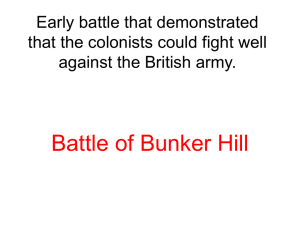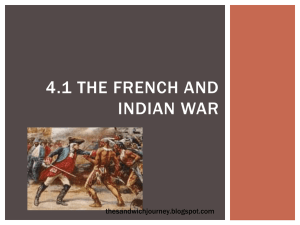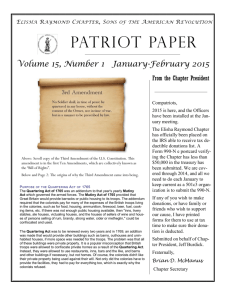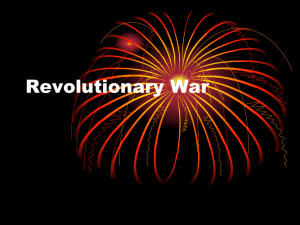File - US History I
advertisement
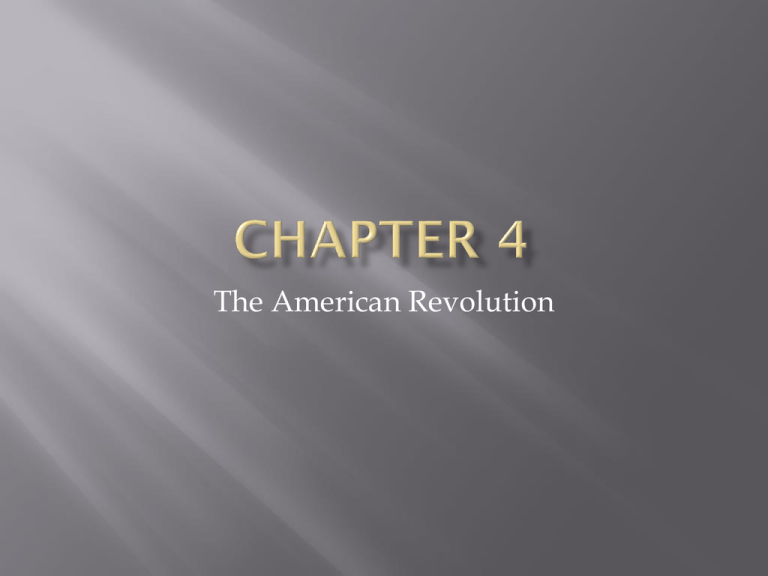
The American Revolution War between French / Native Americans and Great Britain / British subjects living in present day America France and Great Britain had always fought over territory in North America George Washington emerged as a heroic leader in the battle against the French The Albany Conference offered the first suggestion that the colonies unite to form a federal government Treaty of Paris ended war in 1763, and for the most part eliminated French power in North America The war created serious debt for Great Britain – they looked to its colonies to help pay for the war Meanwhile, Native Americans began attacking British forts and troops because colonists were defying land treaties and moving into Natives land The British, not wanting to start another war, declared the Proclamation of 1763 that drew a boundary along the Appalachian trail, limiting colonist settlement west of the line – this greatly angered farmers and land speculators - - - - - Stricter penalties for smugglers who did not pay taxes Sugar Act – changed tax rates and added taxes to certain goods that were not taxed before Currency Act – banned paper money in colonies because it loses value quickly Stamp Act – required stamps to be put on certain printed material Quartering Act – colonists paid more for their defense Colonists began discussing that it is not right to be taxed if they are not represented in the government “ taxation without representation” Organized the Sons of Liberty that held meetings and demonstrations against tax laws – also used intimidation and violence against British tax collectors Non-importation agreement – signed by merchants who refused to buy and sell British goods - - - British repealed Stamp Act, but passed Declaratory Act which gave them power to make laws for the colonies Also, the Townshend Acts Continued to create additional tax laws on imports Harsh punishments for violators of tax laws Legalized use of ‘writs of assistance’- ability for custom officer to search home of those suspected to smuggle or defy tax laws Documents were published saying that only assemblies elected by colonists had the right to tax other colonists Sons of Liberty encouraged boycotting of British goods Colonists would continuously harass British soldiers March 5, 1770 colonists began throwing snowballs and taunting soldiers to the point where one fired into a crowd of people From then on the British were viewed as tyrants who killed people that stood up for their rights Result: British repealed all but one tax – on tea Re-read Chapter 4 section 3 up to “Philadelphia Falls” and answer the following questions as you read. What three major disadvantages did the British face in the American Revolution? Describe the Northern Campaign ( General Howe’s strategy to get the colonists to surrender) Draw a picture of what you would picture the Crossing of the Delaware to look like. Crossing of the Delaware by George Caleb Bingham Which do you think is more historically accurate? Why? Crossing of the Delaware by Emmanuel Leutze What was the initial goal of the military plan that eventually led to the Battle of Brandwine Creek? What was the strategy? What were the results? Initial goal : isolate New England from the other American states Strategy : British troops would march south, north, and west to meet in Albany then march together east into New England Results : failed because of lack of communication between British troops – somehow General Howe made his own plans and took his troops to Philadelphia with the belief that if Philadelphia could be taken then the Continental Congress ( colonial government) would cripple and the Revolution would be over https://www.youtube.com/watch?v=SMe8KUOXU0 Why is Valley Forge a good strategic location for Washington to set up troops? How do Washington’s troops feel about the Prussian officer von Steuben and why? After reading Washington’s letter to the governor, compare and contrast the cartoon of Valley Forget to the actual experience of Washington and his troops. 1776- British capture NYC- headquarters for British for rest of war Dec/Jan 1776/1777 – American troops capture Trenton and Princeton – place to camp for winter September 1777 – British troops captured Philadelphia – military success but failed to cripple Continental Army like they hoped June 1777 - Battle of Saratoga – American victory – turning point for war British take Savannah, Georgia – 1778 – returned British royal governor to power British take Charlestown, SC – 1780 – greatest American defeat in war Battle of Kings – October 1780 – turning points in south for Americans – mountain men attacked British and took back most of land won by British Battle of Yorktown – September/October 1781 – marked the end of the war September 3, 1783 Britain recognized the US as a new nation with the Mississippi River as its western border Britain gave Florida back to Spain Britain gave back colonies in Africa and the Caribbean to France
